
Home

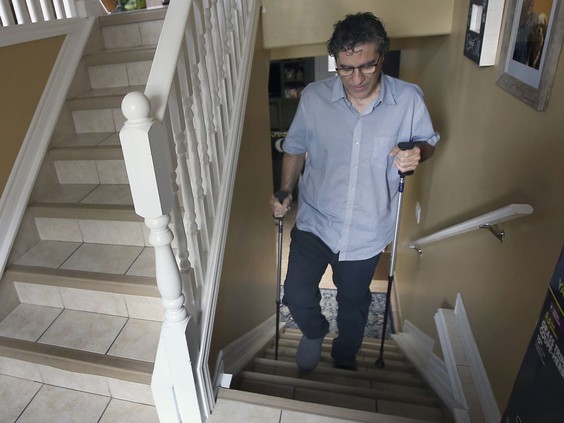
Just days after Domenic Scandale tested positive for COVID-19 in mid-December, he collapsed in his bathroom around 1 a.m., unable to catch his breath.
“I almost passed out, I couldn’t breathe,” he recalled. “I told my wife, ‘call an ambulance.’”
But in the back of the ambulance, Scandale, 55, had no idea of the endless nightmare ahead — one that repeatedly almost claimed his life. To this day, his health is debilitated in several ways.
“I was thinking they will take me in, give me some oxygen and I’m coming back home that night,” he said. “I never imagined this.”
What Scandale didn’t realize was how dangerously low his oxygen levels had dropped.
“Everything happened so fast. If I wouldn’t have went when I did, I don’t think I would have made it. I was told I came in just in time.”
Despite no previous major health problems, Scandale was rushed to the intensive care unit and remained there for weeks. He spent more than a month on a ventilator.
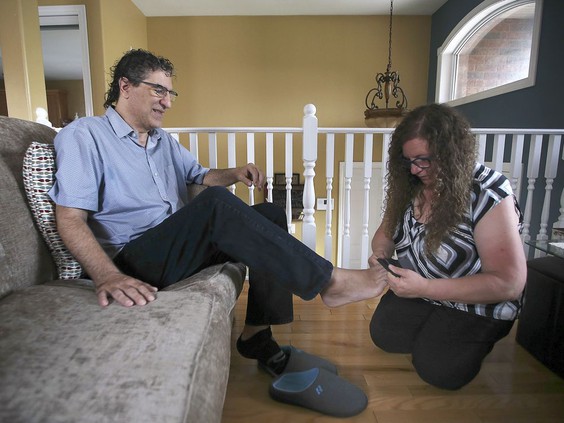
Scandale recalls next to nothing of the odyssey, only waking up enough on Jan. 28 to see him himself in a mirror with tubes connected throughout his body.
“That’s the only bonus is I don’t remember everything,” he said.
Scandale remained hospitalized at Windsor Regional’s Met campus until Feb 28. But afterwards, he didn’t return home and was instead admitted into Hotel-Dieu Grace Healthcare for rehabilitation for another six weeks.
To this day, there is little explanation for Scandale’s fate — only that the story is increasingly common for hundreds of people in the Windsor area and thousands across Canada who have become COVID-19 “long-haulers.”
Local health-care officials estimate five to 10 per cent of those affected by the virus suffer long-term health impacts.
When Scandale finally returned home in the second week of April, he still struggled to walk, his arms were “like stone” and he was largely unable to do much with his hands. With ongoing therapy, by mid-May he could walk with the aid of poles, and his hands were slowly moving.
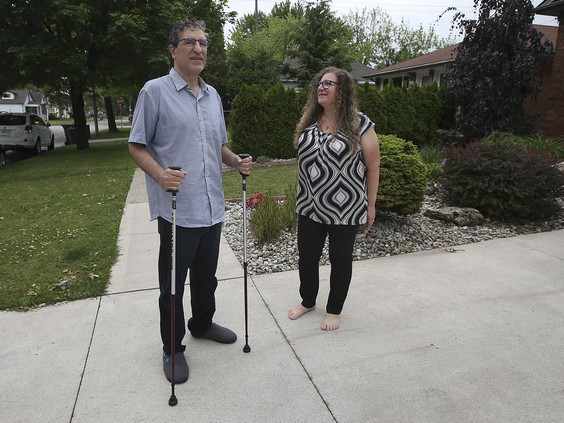
“I’m almost able to make a fist right now,” he said.
He had at least another nine weeks of therapy ahead.
Employed with a local mechanical engineering firm, Scandale loves to paint or play the drums and guitar in his free time — but all that for now is gone.
“I get so depressed I can’t play the guitar at all,” he said. “This is really taking away my passions from me.
“I still can’t figure out how I got (the virus). It’s so emotional for me. I could never have imagined this.”
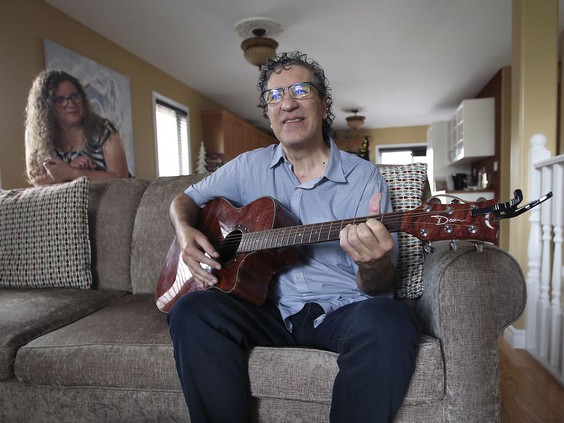
The numbers of long-haulers directed to Hotel-Dieu Healthcare for COVID-19-related rehabilitation has for months remained steady, said Joe Karb, vice-president of restorative care at the hospital.
Each “long-haul” patient that comes in receives a full assessment to determine what programs they need.
The symptoms are rarely the same. They vary widely from heart or lung troubles, cognitive issues or lost motor skills such as with Scandale, he said.
“Some of them come in with a whole host of issues,” Karb said.
Even 15 months after the pandemic hit Windsor, only during the past few months has a dedicated effort started to track the aftermath for those with COVID-19.
“I think it will take two or three years of solid data on what the overall impact of this has been on the body,” Karb said. “Right now, nobody truly knows.
“We are seeing several people whose illness is quite catastrophic and last for a long period of time. Some individuals may never see a full recovery, especially those where there is some brain (impairment).”
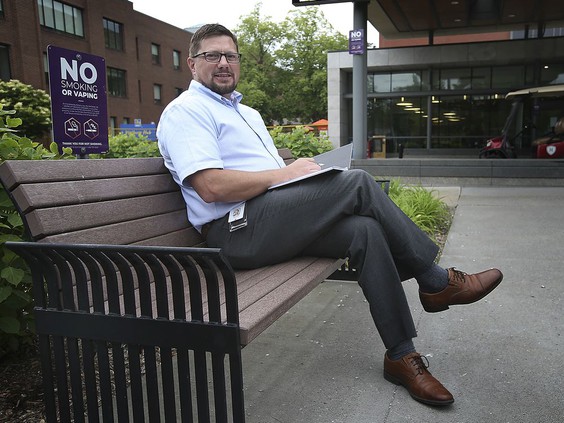
Some people for example can’t remember how to prepare a meal. Others are no longer able to enjoy their regular walks due to breathing struggles or lack of strength.
“They go 100 feet and need to take a seat,” Karb said. “We have not seen a virus like this that attacks the lungs, then will start to impact the brain, then the heart or other body systems.”
He noted how governments to date have fixated on fighting the virus itself without focusing on the long-term damage some people face.
“We just continue to treat them,” Karb said. “For long-haulers, there is nothing in funding. We need studies and data over time. What are the lingering effects of this and how many individuals who had COVID are suffering?”
Rev. Maurice Restivo recently gained prominence in Windsor for his ongoing efforts to save historic Assumption Church — though his work is now on hold.
He tested positive for the virus in the last week of January and for a few weeks afterwards fought through difficult symptoms.
“I had a strong headache, incredible fatigue, nausea and fever for about two and a half weeks,” he said. “I never lost my sense of taste or smell, but I don’t think I have ever felt as sick as I did.”
After a brief recovery period, the 66-year-old parish pastor recently relinquished his duties due to ongoing health struggles still haunting him several months later. His physician officially labelled Restivo a “long hauler.”
“I was given a five-week gradual reintegration plan,” Restivo said. “I was very confident everything had passed.
“But by the end of five weeks, I was still unable to take a full Sunday mass. I had incredible fatigue, shortness of breath. At the end of mass, I’d be holding on to the altar.”
He tried reducing duties. The local priest would “have a good day, but then fall back same as before.”
Under his physician’s advice he left Windsor several weeks ago for his hometown of Houston. It was felt support of family — where he has two sisters — and southern climate would help his ongoing recovery.
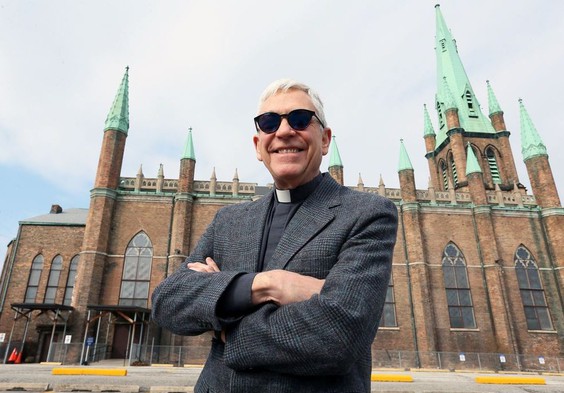
Restivo arrived in Texas the last week of April, but continues to battle breathing issues, chest pain, fatigue and digestion troubles.
“It’s a little frustrating,” he said, pointing to his faith as relieving him of any fear regarding his future health. “Whatever happens will happen and I will deal with it. My hope is to get fully recovered and resume all duties of the parish in Windsor.
“My doctor has told me with all this being so new we don’t know how long that will be — and there is a possibility some damage will be permanent. We just don’t know. He said I sound like I have smoker lungs — and I’m not a smoker.”
Restivo cited a previous broken leg as the worst thing in his health history.
“I’m okay. I’m not an invalid or anything,” he said. “I would say I’m probably 70 per cent of what I used to be. I just don’t have the strength. Every day, I reach a point — it could be in the morning or not until evening — where I hit a wall, my voice changes (weaker) and that is all I can do that day.”
For anyone who suggests COVID-19 isn’t real, “they need to rethink that,” Restivo said.
“I have had parishioners say it’s a hoax,” he said. “Well, I have never experienced a hoax like this before. It’s very real to me and a lot of other people. This has taken a lot of people’s lives and needs to be taken with a lot of seriousness.”
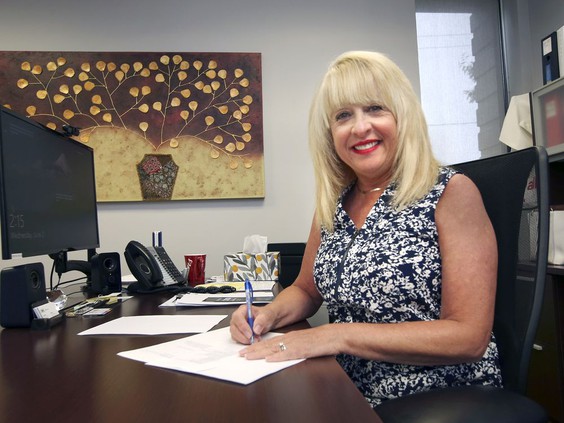
Unemployed Help Centre CEO June Muir was the first high-profile case locally to test positive for the virus — having done so in March 2020 after a short trip to New York to help a friend’s daughter move.
“I went there before all the announcements and heightened information on COVID,” she said.
At 63 years old, Muir suffered greatly from symptoms that included extreme fatigue, shortness of breath and cough “to the point I could not talk.”
It wasn’t long before she passed on the virus to her husband.
“Back then, everything was so scary because nobody knew a lot,” she said.
It took her nearly three months before returning to work at the help centre.
While her husband recovered fully over a reasonable period of time, Muir did not. She struggled with heart palpitations, continued coughing, shortness of breath, brain fog and most of all total lack of energy.
“I’m the type that can work 12 hours a day,” she said. “I was so fatigued it was frustrating. I had coughing fits. I always had a good memory, then suddenly was saying ‘I didn’t remember to do that today.’
“I just wanted to be me again. I wanted to feel good, not tired or short of breath.”
Working closely with her physician, months of exercise, eating right, Vitamin D and use of an inhaler, it was only in April — more than a year after being diagnosed — Muir finally felt “I turned the corner.”
“I’m just noticing now not having shortness of breath, just feeling much better,” she said. “But it’s taken a year.
“This is a scary virus. You just don’t know what it’s going to do to you. I’m feeling better today, but in two months am I going to relapse again? Nobody knows.”
While Ontario seemingly drags its feet on the issue of long-haulers, across the border in Michigan about 10 clinics solely designed to treat long-term patients have already opened — the latest in early May in Ann Arbor connected to the University of Michigan’s medical facilities.
“There is an urgent need to better understand the long-term complications of COVID-19 and provide specialized care for high-risk groups of patients,” said Michigan Medicine endocrinologist Dr. Rodica Pop-Busui, director of the new Multidisciplinary Post COVID-19 Clinic.
In Windsor, significant work is now starting to aid former virus patients in need.
A local study led by Dr. Wassim Saad, chief of staff at Windsor Regional Hospital, plus other area medical leaders that include Dr. Andrea Steen at Hotel-Dieu Grace Healthcare and Dr. Ross Moncur at Erie Shores Healthcare, will launch in the coming days.
The study will involve contacting all area patients who tested positive for COVID-19 and questioning them on lasting impacts. Information will be entered in a registry.
“We have a list of everyone who tested positive,” Saad said. “We will ask whether they still have symptoms, how long have they lasted and whether there were any predisposing factors. We will tie that information into other research.”
Such research is necessary to encourage the provincial government to act and hopefully soon open clinics or provide funding dedicated specifically to long-haulers, he said.
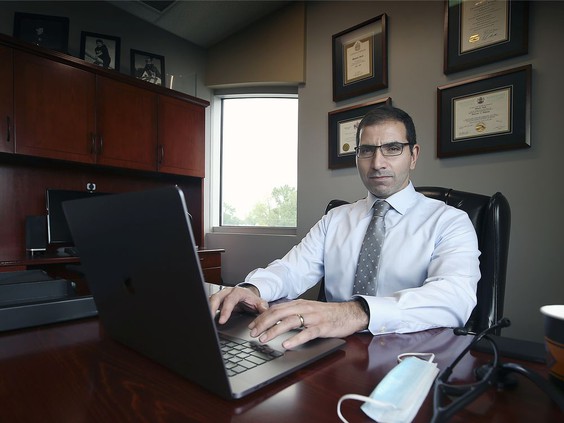
“Long-haulers are likely to put a tremendous strain on our health system moving forward,” Saad said. “A number of patients may require treatment for months or years. It’s not (yet) being looked into. It’s very important for us to know what impact this is having on our region and how are we set up to deal with this?”
He estimates it will take the local study team at least a few months to gather the information, then another few months to put it all together with some sort of conclusions for Ontario’s health ministry.
The provincial government seems focused on battling the third wave of the virus currently, “but they have to start thinking about long-term effects and how to help patients,” Saad said. “I am concerned it’s not on their radar.”
At the hospital, the most prominent health issues of long-haulers are fatigue and breathing difficulties, he said.
“Even a year later, there is still evidence of scarring on the lungs and lung damage,” Saad said.
Others have joint pain, chest pain, difficulty sleeping or brain fog. Patients with long-haul symptoms have come from every demographic, age group and previous health background. He guessed lingering struggles appear in roughly 10 to 15 per cent of those who tested positive for the virus.
“There are patients in their 80s with no (long-term) effects at all,” Saad said. “Then we have those in their 30s or 40s who had few symptoms (with the virus), but they have long-haul symptoms. We don’t know what puts people at risk for long-haul symptoms. It seems to be any age or severity of the illness.
“I know other areas have already set up long-haul clinics. We need a coordinated effort to set up and take care of these patients when the time comes.”
Scandale ended up passing COVID-19 to his wife and two adult daughters — who only suffered minor symptoms “and they were done,” he said.
He communicates online with other long-haulers across Canada and the U.S. for tips on how to improve his own health.
“The worst thing is you get a little emotional, really feel depressed,” he said. “At night, it really plays with your head.
“I know everybody (medically) is trying to help the best they can, but no one is knowledgeable because no one has seen this before. When they see my hands they compare it to patients with strokes or arthritis. But why?
“Long term, the government needs to step up and help people because COVID could destroy a lot of families or people financially. I fear long-haulers are being forgotten.”
